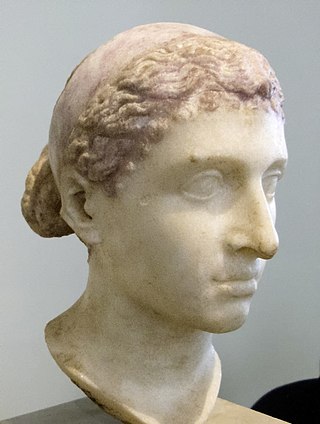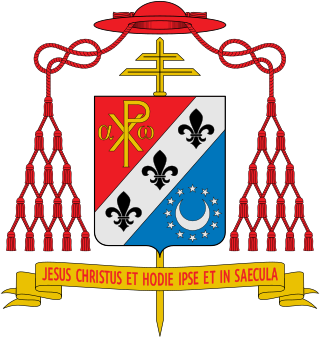Related Research Articles

The Holy See, also called the See of Rome, Petrine See or Apostolic See, is the central governing body of the Catholic Church and the Vatican City State. It encompasses the office of the pope as the bishop of the Apostolic episcopal see of Rome and serves as the spiritual and administrative authority of the worldwide Catholic Church and the city-state. Under international law, the Holy See holds the status of a sovereign juridical entity.

Hadrian was Roman emperor from 117 to 138. Hadrian was born in Italica, close to modern Seville in Spain, an Italic settlement in Hispania Baetica; his branch of the Aelia gens, the Aeli Hadriani, came from the town of Hadria in eastern Italy. He was a member of the Nerva–Antonine dynasty.
The Julian calendar is a solar calendar of 365 days in every year with an additional leap day every fourth year. The Julian calendar is still used as a religious calendar in parts of the Eastern Orthodox Church and in parts of Oriental Orthodoxy as well as by the Amazigh people.

The pope is the bishop of Rome and the visible head of the worldwide Catholic Church. He is also known as the supreme pontiff, Roman pontiff, or sovereign pontiff. From the eighth century until 1870, the pope was the sovereign or head of state of the Papal States, and since 1929 of the much smaller Vatican City state. From a Catholic viewpoint, the primacy of the bishop of Rome is largely derived from his role as the apostolic successor to Saint Peter, to whom primacy was conferred by Jesus, who gave Peter the Keys of Heaven and the powers of "binding and loosing", naming him as the "rock" upon which the Church would be built. The reigning pope is Francis, who was elected on 13 March 2013.
The Roman Curia comprises the administrative institutions of the Holy See and the central body through which the affairs of the Catholic Church are conducted. The Roman Curia is the institution which the Roman Pontiff ordinarily makes use of in the exercise of his supreme pastoral office and universal mission in the world: thus curialism refers traditionally to an emphasis on the supreme authority of the Holy See within the Catholic Church. It is at the service of the Pope and bishops, fulfilling their function with an evangelical spirit, working for the good and at the service of communion, unity and edification of the Universal Church and attending to the demands of the world in which the Church is called to fulfill its duty and mission.
In Christian denominations, an archbishop is a bishop of higher rank or office. In most cases, such as the Catholic Church, there are many archbishops who either have jurisdiction over an ecclesiastical province in addition to their own archdiocese, or are otherwise granted a titular archbishopric. In others, such as the Lutheran Church of Sweden, the title is only borne by the leader of the denomination.

Cleopatra VII Thea Philopator was Queen of the Ptolemaic Kingdom of Egypt from 51 to 30 BC, and its last active ruler. A member of the Ptolemaic dynasty, she was a descendant of its founder Ptolemy I Soter, a Macedonian Greek general and companion of Alexander the Great. Her first language was Koine Greek, and she is the only Ptolemaic ruler known to have learned the Egyptian language. After her death, Egypt became a province of the Roman Empire, marking the end of the last Hellenistic-period state in the Mediterranean, a period which had lasted since the reign of Alexander.

Cybele is an Anatolian mother goddess; she may have a possible forerunner in the earliest neolithic at Çatalhöyük. She is Phrygia's only known goddess, and likely, its national deity. Greek colonists in Asia Minor adopted and adapted her Phrygian cult and spread it to mainland Greece and to the more distant western Greek colonies around the sixth century BC.

Religion in ancient Rome consisted of varying imperial and provincial religious practices, which were followed both by the people of Rome as well as those who were brought under its rule.

The Catholic Church, also known as the Roman Catholic Church, is the largest Christian church, with 1.28 to 1.39 billion baptized Catholics worldwide as of 2024. It is among the world's oldest and largest international institutions and has played a prominent role in the history and development of Western civilization. The church consists of 24 sui iuris churches, including the Latin Church and 23 Eastern Catholic Churches, which comprise almost 3,500 dioceses and eparchies around the world. The pope, who is the bishop of Rome, is the chief pastor of the church. The Diocese of Rome, known as the Holy See, is the central governing authority of the church. The administrative body of the Holy See, the Roman Curia, has its principal offices in Vatican City, which is a small, independent city-state and enclave within the city of Rome, of which the pope is head of state and absolute elective monarch.
A dicastery is the name of some departments in the Roman Curia of the Catholic Church.
The hierarchy of the Catholic Church consists of its bishops, priests, and deacons. In the ecclesiological sense of the term, "hierarchy" strictly means the "holy ordering" of the church, the Body of Christ, so to respect the diversity of gifts and ministries necessary for genuine unity.

The Catholic Church in Tunisia is part of the worldwide Catholic Church, under the spiritual leadership of the Pope in Rome.
Charles Alexander Kazimieras Salatka was an American prelate of the Roman Catholic Church. He served as archbishop of the Archdiocese of Oklahoma City in Oklahoma from 1977 to 1992. Salatka was the first bishop of Lithuanian descent in the United States.

Aníbal Muñoz Duque was a Roman Catholic Cardinal and Archbishop of Bogotá.
This is a glossary of terms used within the Catholic Church. Some terms used in everyday English have a different meaning in the context of the Catholic faith, including brother, confession, confirmation, exemption, faithful, father, ordinary, religious, sister, venerable, and vow.
Cariana may refer to:

Everardus Johannes (Everard) de Jong is a Dutch prelate of the Roman Catholic Church. He is auxiliary bishop of Roermond since 1999.
Cicindela cariana is a species in the beetle family Cicindelidae. It is found in Myanmar and Thailand.
References
- ↑ Lentz III, Harris M. (11 July 2015). Popes and Cardinals of the 20th Century: A Biographical Dictionary. McFarland. p. 131. ISBN 978-1-4766-2155-5.